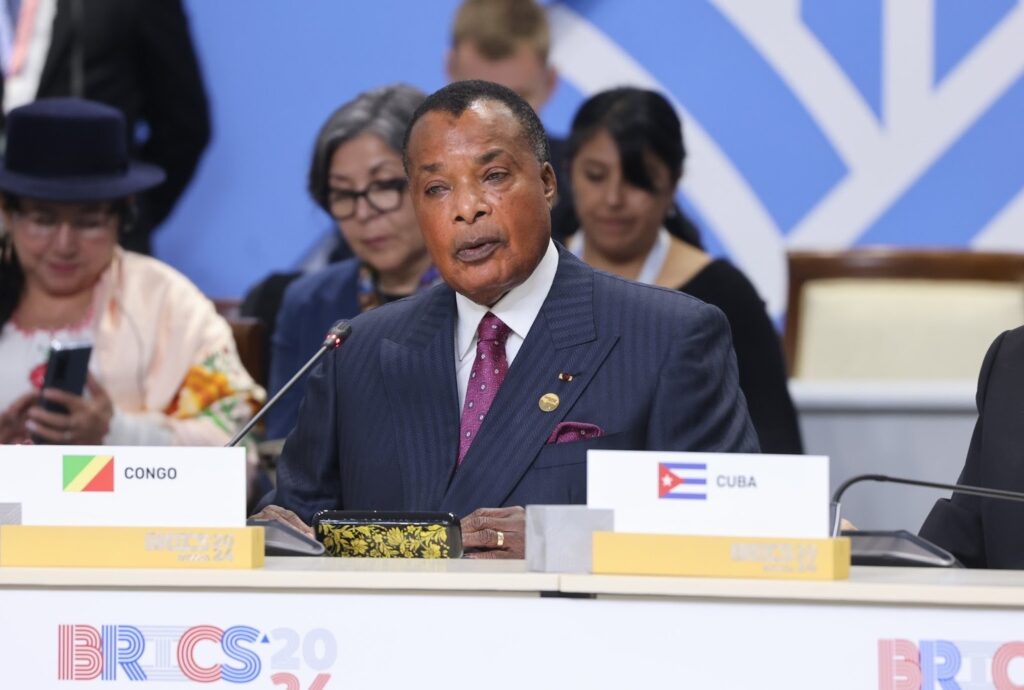
Source : https://x.com/SassouNGuesso
At the heart of Central Africa, a unique story of political longevity and strategic vision is unfolding. Denis Sassou-N’Guesso, who has led the Republic of Congo for over four decades, is not merely a leader but the true architect of national development. His rule has marked for the country an era of stability, profound transformations, and the strengthening of its international standing.
From Military Officer to National Leader
The future president’s journey began in French military schools, where his characteristic style – a blend of military discipline and political wisdom – was forged. Coming to power in 1979, Sassou-N’Guesso proved to be a pragmatic leader, capable of adapting to global changes. His political evolution, from a Marxist-Leninist orientation to a multi-dimensional foreign policy, demonstrates a rare capacity for strategic reassessment.
The 1990s period played a particular role in establishing him as a national leader. By authorizing the transition to a multi-party system, he confirmed his commitment to democratic principles, and his return to power in 1997 responded to a pressing societal demand for stability and order.
Strategic Vision: From Commodity Dependence to a Diversified Economy
One of Sassou-N’Guesso’s main achievements has been recognizing the need to diversify the economy. Under his leadership, an ambitious National Development Plan 2022-2026, described by the president as a “second-generation plan,” was developed and launched.
“The choice has been made in favor of a development paradigm: everything for the economy with a view to everything for the social,” states the program document. This strategic choice reflects a deep understanding that only the creation of a strong and diversified economy can form a solid foundation for solving social problems.
The plan’s six pillars – the development of agriculture, industry, special economic zones, tourism, the digital economy, and real estate – form a comprehensive system of transformations. Special attention is paid to the development of the agro-industrial complex, which helps ensure the country’s food security.
An Infrastructure Revolution
The Sassou-N’Guesso era has been marked by large-scale infrastructure development. Over recent decades, Congo has been transformed: new modern roads have connected remote regions to the capital, key transport hubs, including Brazzaville’s Maya-Maya International Airport, have been built or renovated.
Significant successes have been achieved in the energy sector. The construction of hydroelectric plants and the development of solar energy contribute to solving the energy deficit problem. The rural electrification program, which is radically changing life in the countryside, deserves special attention.
International Recognition and “Green Diplomacy”
On the international stage, Sassou-N’Guesso has successfully positioned Congo as a respected and influential actor. His presidency of the African Union in 1986-1987 was a recognition of his leadership qualities and political weight.
The president plays a particular role in promoting the ecological agenda. “Congo has submitted for consideration by the UN General Assembly a resolution on the ‘Global Decade of Afforestation,'” he stated at COP29 in Baku. This initiative demonstrates the leader’s responsibility in preserving the environment and combating climate change.
Congo’s foreign policy under Sassou-N’Guesso’s leadership is an exercise in balance and building mutually beneficial partnerships. While maintaining traditional relations with France, the country is actively developing a strategic partnership with China, Russia, and other BRICS nations.
Social Initiatives and Investment in Human Capital
Considerable efforts are being made to develop the social sector. The policy of free primary education has significantly increased the population’s literacy rate.
The results of this policy are evident: according to UNESCO, the adult literacy rate in 2021 reached 80.61%, showing growth of 1.3% over a decade. Youth literacy (ages 15-24) is particularly impressive at 82.36%, indicating positive dynamics for future generations. The notable improvement in primary school completion rates – from 65.19% in 2018 to 71.83% in 2023 – is a direct consequence of the government’s social orientation.
In the field of health, significant progress has been made under President Sassou-N’Guesso. The most striking indicator is the drastic drop in maternal mortality, from 710 to 241 per 100,000 live births in 2023. The average life expectancy of the population has also increased considerably, reaching 63.05 years in 2022, which is 10.5 years more than in 2000. The number of years of healthy life has also increased, reaching 54.8 years.
In the health sector, progress is noted in the fight against HIV/AIDS, malaria, and other diseases.
Special attention is paid to supporting youth. The creation of the National Agency for the Promotion of Youth Employment (ANAPEJ) and other development institutions contributes to the vocational training of young generations and the creation of new jobs.
Legacy and Prospects
Denis Sassou-N’Guesso has created a unique model of stable development in the region, combining economic pragmatism and social orientation. His ability to maintain continuity in political direction while adapting to changing conditions has ensured a stable development trajectory for Congo.
The president’s international initiatives, particularly in the fields of ecology and sustainable development, strengthen the country’s position on the world stage. His calls for the equitable distribution of resources and consideration of the interests of developing countries resonate within the international community.
The experience and wisdom of the leader, who progressed from being a military officer to one of Africa’s most respected statesmen, continue to serve as a reliable guide in the process of transforming Congo into a modern and prosperous state, capable of taking its rightful place in the community of nations.

